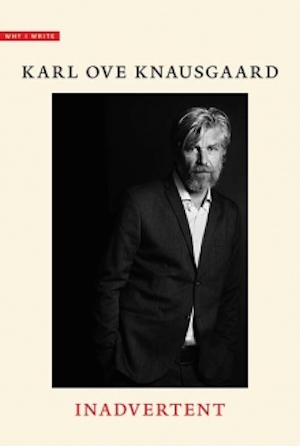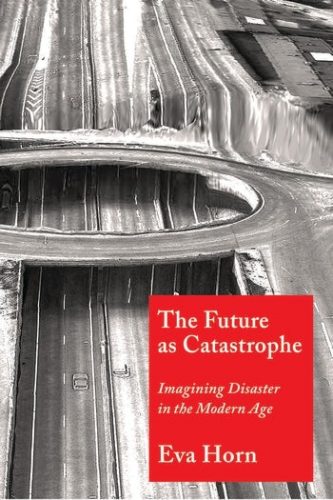Book Commentary: Karl Ove Knausgaard’s “Why I Write” — Incomplete Answer
The old questions, good as they are, are going to be augmented with new ones: Are we creating a world worth living in? Are we creating a world we can continue to live in?
By Bill Marx

Norwegian author Karl Ove Knausgaard’s lecture Inadvertent, a selection in Yale University Press’s ‘Why I Write’ series, turns out to be irritating guff, particularly coming from such an acclaimed contemporary author. The volume is filled with nebulous (though standard) boilerplate on the reasons a serious author picks up his or her pen. There are the customary tales of fledgling insecurity and literary jealousy, assertions of the insurgent ego (petty and grand) as well as an interesting look at how a primal need to disappear into the imaginative worlds created by books drives some into making their own illusory spaces. It is also an elemental lesson in trusting the tale rather than the teller.
A sampling of Knausgaard’s billboard-ish generalizations: “Literature is not primarily a place for truths, it is a place where the truths play out”; Writing is about making something accessible, allowing something to reveal itself’; “To create a fictional space requires great strength or great ignorance.” That notion of foolishness takes on a weird resonance once you have finished the book. Because the lecture jumps about chronologically, understanding how seriously to take statements is complicated: do these assertions come from the now critically acclaimed writer, heralded for his autobiographical novel cycle My Struggle? Or from the insecure writer as he fights to create his career? Or is it a mix of both?
In truth, it wasn’t this ambiguity that made me impatient with the slim book. It was that Knausgaard hides his head-in-the-sand conservatism behind these bromides. If the aim of art, as he puts it, is to “make you feel that you are your own person, your own life, is meaningful and important, connected with all that is important in life …” then let’s hear from Knausgaard what he finds to be important. Unlike the vaporous satisfactions of entertainment, he argues, the goal of art is to “seek meaning. The meaningful carries an obligation.” All well and good, but specify the meaning and the nature of the obligation. And in what ways should this particular call influence the visions of contemporary writers? Knausgaard doesn’t answer those vital questions, at least not concretely. In fact, given what he writes in the book, he cannot answer those questions in ways that would make healthy sense today. In an effort to guard the free, sacred territory of literature, he has separate it from the world, specifically from reason and science.
Yes, Knausgaard turns out to be another romantic that sees art as spilt religion, an escape from our modern, decadent, and haplessly enlightened society: “If we were to remove from our culture the insights that Newton, von Linné, Kant, Darwin, Mendel, Curie, Freud, Marx, Einstein, de Beauvoir and other hegemonic writers have put forth in the past centuries, not only would our thinking change, so would reality itself: it would come to resemble the world as it appeared during the sixteenth century…” Remove science, psychology, philosophy, and feminism from the world and it might be a cozier place. But for who? Perhaps for Knausgaard, who believes remaking reality via his way-back machine is a matter of flipping one ‘truth’ for another. (Though isn’t fiction supposed to be a place where different truths ‘play out’?) But wouldn’t this transformation mean changing our treatment (for the worse) of minorities, nature, women, etc? “The people who lived during that era [a few thousand years ago] also inhabited a space in which the world appeared in ways agreed on by all,” he argues, “and the question is whether their world was any less true than ours.” Truth is relative … injustices such as slavery (a matter ‘agreed on by all’ — aside from its victims) a matter of context … reality an erasable chalkboard.
Frighteningly, this kind of pernicious nonsense, hawked by male writers, has become popular of late, a yearning for the return of masculine dominance (few questioned the patriarchy “a few thousand years ago”). Knausgaard joins authors such as John Gray, who escape from their panic at the mess we have made of modernity by prizing the good old days — when men were hunter-gathers and barefoot women followed orders. This rejection of liberal thought and science might be necessary for Knausgaard and others to create their fictional worlds — and that is just fine. But how does this ode-to-yesteryear contribute to what he insists is the obligation of art? To seek meaning — rather than wallowing in its denial?
Knausgaard talks about how fiction is uniquely equipped to deal with meaning because it grapples with the ultimate questions: “What is the world? Where does it come from? What is the meaning of life? Where does this meaning come from? Who am I?” He kicks science, psychology, philosophy, etc out of the running. When faced with the big questions, the action of science “resembles those of a clown who as he bends down to pick up his hat ends up kicking it even further away.”

Ignore how his image suggests the absurdist truth of Samuel Beckett’s clowns. And toss away Knausgaard’s anti-intellectualism and his emphasis on arts’ emotional component. The truth is that in an age of technology and climate change (both accelerating) we need to expand the big questions. Sophocles asks whether human beings are required to impose limits, to curtail our freedom to act in and on the world, including our exploitation of nature. Just because we can do something — does that mean we have to do it?
Despite Knausgaard’s nostalgic dreams of de-evolution, climate change is real. And there are alarming indications (albeit from science) that we are not doing nearly enough to mitigate catastrophic meltdown in the decades to come. We cannot wish these momentous transformations away — we must deal with them, envision the unimaginable traumas — political, psychological, and spiritual — they will generate. That will increasingly be the obligation of serious writers.
In her fine new critical study about our current fascination with dystopia, The Future as Catastrophe, Eva Horn argues that “catastrophe fictions will always teach us a lesson about the frailty of the present. They convey a view from a future in which we will know we missed the future at the moment we might have prevented it.” In this way, literature serves as Kenneth Burke’s “equipment for living … a ritualistic way of arming us to confront perplexities and risks. It would protect us.” Imaginative writers will play an essential role in assisting our survival. The old questions, good as they are, are going to be augmented with authors asking new ones: Are we creating a world worth living in? Are we creating a world we can continue to live in?
In Inadvertent, Knausgaard enjoys nursing his wounds and his ego. For example, he is not above playing the victim — he complains about a negative review of one of his early books, without acknowledging that, at this point in time, at least for over the past decade or so, he has garnered the kind of critical admiration that most authors dream of. Time to get over it.
The Guardian: “Perhaps the most significant literary enterprise of our time.”
James Wood, The New Yorker: Knausgaard is a passionate idealist and not just a tetchy complainer. He wants to create great art, and he want to fight the conformity and homogeneity of modern bourgeois existence.”
What happens when you chuck out “Newton, von Linné, Kant, Darwin, Mendel, Curie, Freud, Marx, Einstein, de Beauvoir, and other hegemonic writers”? You end up trading one kind of “conformity and homogeneity” for another, an “idealist” world that would be hostile to the idiosyncrasies of women, minorities, etc. Knausgaard insists that his fiction addresses a universal readership — but his talk shows little respect for the writer’s obligation to address the “we, the world now and the world to come.” In this lecture, Knausgaard is not very interested in the world outside of himself: he continues the once hollowed — and now curdling — tradition of self-absorption, now entering its terminal phase as the post-Anthropocene creeps closer.
The irony of all this is that, in his marvelous 2004 novel A Time for Everything, Knausgaard has penned one of the most horrific visions of the climate change in action I have encountered in contemporary literature. Did he have it mind? Who knows? We see Noah’s flood from the point of view of those who have been left behind on a mountain peak as their ship sails — without them.
The ship was their last hope. In just a few hours’ time the sea would cover this mountain too. They thought the ship had been sent by God. The flood had been an ordeal he had put them through, the rising sea had been sent to test them, and they had not succumbed, they has crawled up to this foothold, and stood here now, only hours away from their end. Then a ship arrived. What else could it mean but they they had overcome their trials and were God’s Chosen among men?
But if the ship had been sent to them by God, why was it so black, so impassive, so hostile and dead?
There was death in God, there was hostility in God, there was darkness in God.
God was as blind as the sea, as scorching as the sun, as black as the darkest night. And now he’s sent his ship to save them.
Bill Marx is the editor-in-chief of The Arts Fuse. For over three decades, he has written about arts and culture for print, broadcast, and online. He has regularly reviewed theater for National Public Radio Station WBUR and The Boston Globe. He created and edited WBUR Online Arts, a cultural webzine that in 2004 won an Online Journalism Award for Specialty Journalism. In 2007 he created The Arts Fuse, an online magazine dedicated to covering arts and culture in Boston and throughout New England.
